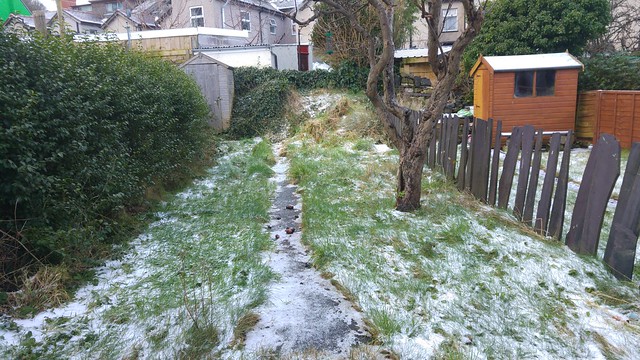Words for storm and related things in Celtic languages.
Words marked with a * are reconstructions.
| Proto-Celtic | *sīnā = weather |
|---|---|
| Old Irish (Goídelc) | sín [ˈsʲiːn/ˈsʲiːnʲ] = storm, tempest, (bad) weather |
| Middle Irish (Gaoidhealg) | sín = bad weather, storm, weather, season, circumstances, atmosphere, attitude |
| Irish (Gaeilge) | síon = weather (usually bad, stormy) síonra = atmospheric agencies, elements |
| Scottish Gaelic (Gàidhlig) | sian [ʃiən] = violent weather, the elements, whizzing sound, squall, shriek sianach [ʃiənəx] = stormy, squally, shrieking sianail = (act of) shrieking, yelling siantach [ʃiən̪ˠdəx] = pertaining to generally bad weather marcach-siana = spindrift (spray coming off stormy sea), undulating (sheets of) rain uisge nan seachd sian = almighty downpour, cloudburst, deluge, rainstorm |
| Middle Welsh (Kymraec) | hin = (bad) weather, air hinda, hindda = dry/fine/fair weather hinon = (fair) weather, dry weather, sunshine hinoni = to become fine, clear up, bask in the sun |
| Welsh (Cymraeg) | hin = (bad) weather, air hindreuliad = a weathering hindreuliaf, hindreulio = to weather hindda = dry/fine/fair weather hinddanaf, hinddanu = to become fine, clear up (of weather) hinfynag, = barometer hinon = (fair) weather, dry weather, sunshine hinonaf, hinoni = to become fine, clear up, bask in the sun hinsawdd = climate |
| Cornish (Kernewek) | hin = climate hinek = climatic |
| Middle Breton (Brezonec) | hynon = serene, clear weather |
| Breton (Brezhoneg) | hin = climate hinon = serene, serenity hinoniñ = to have a peaceful time |
Etymology: possibly related to Proto-Celtic *sīniti (to stretch, extend), from *sīros (long), from PIE *seh₁- (long, lasting), or *temp- (to stretch) [source].
| Old Irish (Goídelc) | anfud = tempest, storm |
|---|---|
| Middle Irish (Gaoidhealg) | anbod, anfud = tempest, storm, turbulence, fury, rage anfadach = stormy, perturbed, agitated |
| Irish (Gaeilge) | anfa [ˈanˠəfˠə] =storm, tempest anfach = stormy, rough, tempestuous anfacht = storminess |
Etymology: unknown [source].
| Old Irish (Goídelc) | doinenn = stormy weather, tempest |
|---|---|
| Middle Irish (Gaoidhealg) | doinenn = foul or stormy weather, tempest doinennta = stormy, tempestuous, inclement |
| Irish (Gaeilge) | doineann [ˈd̪ˠɪn̠ʲən̪ˠ] = stormy weather, storm. wintriness, cheerlessness doineanta = stormy, wild, inclement (weather), wintry, cheerless (person) doineantach = cheerless, cold-mannered, person; gloomy old man doineantacht = storminess, inclemency (weather), wintriness, cheerlessness (demeanour) |
| Scottish Gaelic (Gàidhlig) | doineann [dɤn̪ʲan̪ˠ] = storm, tempest doineannach [dɔn̪ʲən̪ˠəx] = stormy doireannach [dɔrʲən̪ˠəx] = stormy |
| Manx (Gaelg) | dorrin = storm, tempest dorrinagh = stormy, tempestuous dorrinys = storminess, tempestuousness, raging |
Etymology: unknown [source].
| Middle Irish (Gaoidhealg) | stoirm = storm |
|---|---|
| Irish (Gaeilge) | stoirm [ˈsˠt̪ˠɪɾʲəmʲ] = storm, bluster, rage stoirmeach = stormy, tempestuous |
| Scottish Gaelic (Gàidhlig) | stoirm [sdɤrʲɤm] = storm stoirmeil [sdɤrʲɤmal] = stormy |
| Manx (Gaelg) | sterrym = storm sterrymagh = stormy sterrymid = storminess |
| Middle Welsh (Kymraec) | ystorm, ystorym = storm, tempest |
| Welsh (Cymraeg) | (y)storm = storm, tempest (y)stormio = to become stormy, bluster, rain heavily, rant, scold (y)stormus = stormy, tempestuous, turbulent, boisterous |
Etymology: from Middle English storm (storm, dispute, brawl, fight), from Old English storm (storm), from Proto-West-Germanic *sturm (storm), from Proto-Germanic *sturmaz (storm), from PIE *(s)twerH- (to stir up, agitate, urge on, propel) [source].
| Middle Welsh (Kymraec) | tywyd = weather |
|---|---|
| Welsh (Cymraeg) | tywydd [ˈtəu̯.ɨ̞ð / ˈtəu̯.ɪð] = weather, bad or stormy weather tywyddiant = meterology tywyddol = pertaining to the weather |
| Cornish (Kernewek) | tewedh = storm tewedha = to weather |
Etymology: unknown
More about words for weather (and time) in Celtic languages.
Sources: Wiktionary, Am Faclair Beag, Online Manx Dictionary, Teanglann.ie, eDIL – Electronic Dictionary of the Irish Language, In Dúil Bélrai English – Old Irish glossary, Geiriadur Prifysgol Cymru, Gerlyver Kernewek, Lexicon Cornu-britannicum: A Dictionary of the Ancient Celtic Language of Cornwall, Dictionaire Favereau, TermOfis, Le dictionnaire diachronique du breton, Etymological Dictionary Of Proto Celtic





